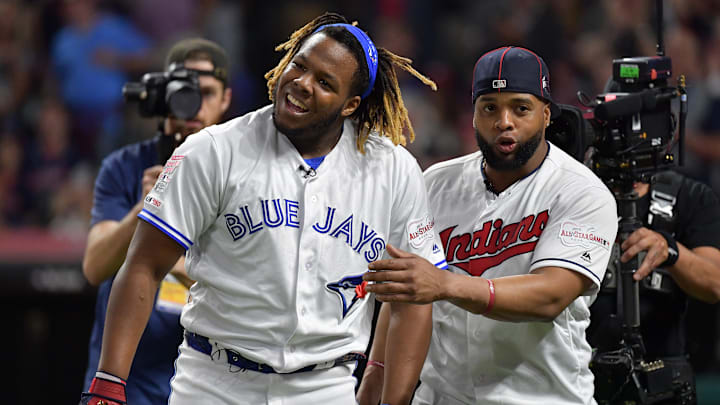Complete List of Past MLB Home Run Derby Winners
Over the years, we have seen many players rise to stardom as a result of participating in the Home Run Derby, as well as those that have cemented their status as “elite” power-hitting baseball players in the process. Below, we have provided the complete list of all past winners for the event dating back to 1985.
Year | Winner |
|---|---|
1985 | Dave Parker, Cincinnati Reds |
1986 | Wally Joyner, California Angels and Darryl Strawberry, New York Mets |
1987 | Andre Dawson, Chicago Cubs |
1989 | Ruben Sierra, Texas Rangers and Eric Davis, Cincinnati Reds |
1990 | Ryne Sandberg, Chicago Cubs |
1991 | Cal Ripken Jr., Baltimore Orioles |
1992 | Mark McGwire, Oakland Athletics |
1993 | Juan Gonzalez, Texas Rangers |
1994 | Ken Griffey Jr., Seattle Mariners |
1995 | Frank Thomas, Chicago White Sox |
1996 | Barry Bonds, San Francisco Giants |
1997 | Tino Martinez, New York Yankees |
1998 | Ken Griffey Jr., Seattle Mariners |
1999 | Ken Griffey Jr., Seattle Mariners |
2000 | Sammy Sosa, Chicago Cubs |
2001 | Luis Gonzalez, Arizona Diamondbacks |
2002 | Jason Giambi, New York Yankees |
2003 | Garret Anderson, Anaheim Angels |
2004 | Miguel Tejada, Baltimore Orioles |
2005 | Bobby Abreu, Philadelphia Phillies |
2006 | Ryan Howard, Philadelphia Phillies |
2007 | Vladimir Guerrero, Los Angeles Angels |
2008 | Justin Morneau, Minnesota Twins |
2009 | Prince Fielder, Milwaukee Brewers |
2010 | David Ortiz, Boston Red Sox |
2011 | Robinson Cano, New York Yankees |
2012 | Prince Fielder, Detroit Tigers |
2013 | Yoenis Cespedes, Oakland Athletics |
2014 | Yoenis Cespedes, Oakland Athletics |
2015 | Todd Frazier, Cincinnati Reds |
2016 | Giancarlo Stanton, Miami Marlins |
2017 | Aaron Judge, New York Yankees |
2018 | Bryce Harper, Washington Nationals |
2019 | Pete Alonso, New York Mets |
2021 | Pete Alonso, New York Mets |
2022 | Juan Soto, Washington Nationals |
The event was cancelled only twice in its existence: in 1988, when the competition was cancelled due to inclement weather (rain), and in 2020 as a result of the COVID pandemic.
Multi-time winners of the event included Ken Griffey Jr., Prince Fielder, Yoenis Céspedes, and Pete Alonso, with Griffey and Céspedes being the only two participants to successfully defend their title the following year (Alonso could be sort of classified in that category as well, but his title defence was interrupted in between by a year with the COVID pandemic). Fielder, on the other hand, remained the only player to win the title for two different teams in two different leagues.
But the overall “Home Run King” title should strictly belong to Griffey himself, being the only player to win the competition three times, in addition to finishing second on three other separate occasions.
